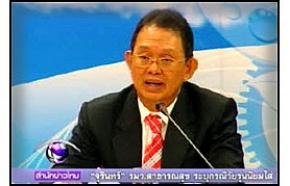ID :
166674
Wed, 03/09/2011 - 05:39
Auther :
Shortlink :
http://m.oananews.org//node/166674
The shortlink copeid
Thai private sector fears diesel price will soar if the government subsidy eventually ends

BANGKOK, March 9 (TNA) - The Thai private sector fears that the diesel price will soar if the government subsidy eventually ends.
Speaking of the government’s resolution to cap the price of diesel at 30 baht per liter until the end of April, the Federation of Thai Industries (FTI) chairman Payungsak Chartsutipol said that the government should let market mechanisms influence the prices of oil and products and intervene temporarily only to prevent the impacts of price fluctuations.
He warned that the subsidy should be temporary; otherwise, it would cause problems. He said that if the oil price rose too much and the prolonged subsidy had to end, people would suffer from skyrocketing prices. He advised that the government should allow the oil price to go up some times to let people and businesses adjust themselves.
Meanwhile, Pongsak Assakul, deputy chairman of the Thai Chamber of Commerce, urged the government to find an equilibrium between the revenue and expenses of the State Oil Fund. He also suggested that the government consider not only the immediate implications but the long-term ones too. He said he did not know why the government was freezing the diesel price and that if the subsidy continued for too long, its eventual end would cause a surge in product and oil prices.
The meeting of the Federation of Thai Industries, the Board of Trade of Thailand and the Thai Bankers’ Association resolved to write to Prime Minister Abhisit Vejjajiva in his capacity as the chairman of the National Energy Policy Committee, asking him to freeze the price of liquified petroleum gas until June this year. They fear that the floatation of the price of petrol will heavily affect many industries, especially those of glass and ceramics.
Another increase being proposed is that of the national minimum wage. Following a recent meeting, representatives of the private sector think that the decision should rest with the tripartite wage committee and be based on many factors including inflation, spending ability, economic factors and the quality of life. The private sector has no qualms with a raise in the minimum wage twice a year as long as the process complies with normal mechanisms and relevant laws.
In full, the proposal would bring a 25% increase within two years. This is a potential move that some industries can afford that but that most would struggle with, as they are still feeling the effects of an 11% increase just last January. (TNA)
Speaking of the government’s resolution to cap the price of diesel at 30 baht per liter until the end of April, the Federation of Thai Industries (FTI) chairman Payungsak Chartsutipol said that the government should let market mechanisms influence the prices of oil and products and intervene temporarily only to prevent the impacts of price fluctuations.
He warned that the subsidy should be temporary; otherwise, it would cause problems. He said that if the oil price rose too much and the prolonged subsidy had to end, people would suffer from skyrocketing prices. He advised that the government should allow the oil price to go up some times to let people and businesses adjust themselves.
Meanwhile, Pongsak Assakul, deputy chairman of the Thai Chamber of Commerce, urged the government to find an equilibrium between the revenue and expenses of the State Oil Fund. He also suggested that the government consider not only the immediate implications but the long-term ones too. He said he did not know why the government was freezing the diesel price and that if the subsidy continued for too long, its eventual end would cause a surge in product and oil prices.
The meeting of the Federation of Thai Industries, the Board of Trade of Thailand and the Thai Bankers’ Association resolved to write to Prime Minister Abhisit Vejjajiva in his capacity as the chairman of the National Energy Policy Committee, asking him to freeze the price of liquified petroleum gas until June this year. They fear that the floatation of the price of petrol will heavily affect many industries, especially those of glass and ceramics.
Another increase being proposed is that of the national minimum wage. Following a recent meeting, representatives of the private sector think that the decision should rest with the tripartite wage committee and be based on many factors including inflation, spending ability, economic factors and the quality of life. The private sector has no qualms with a raise in the minimum wage twice a year as long as the process complies with normal mechanisms and relevant laws.
In full, the proposal would bring a 25% increase within two years. This is a potential move that some industries can afford that but that most would struggle with, as they are still feeling the effects of an 11% increase just last January. (TNA)





